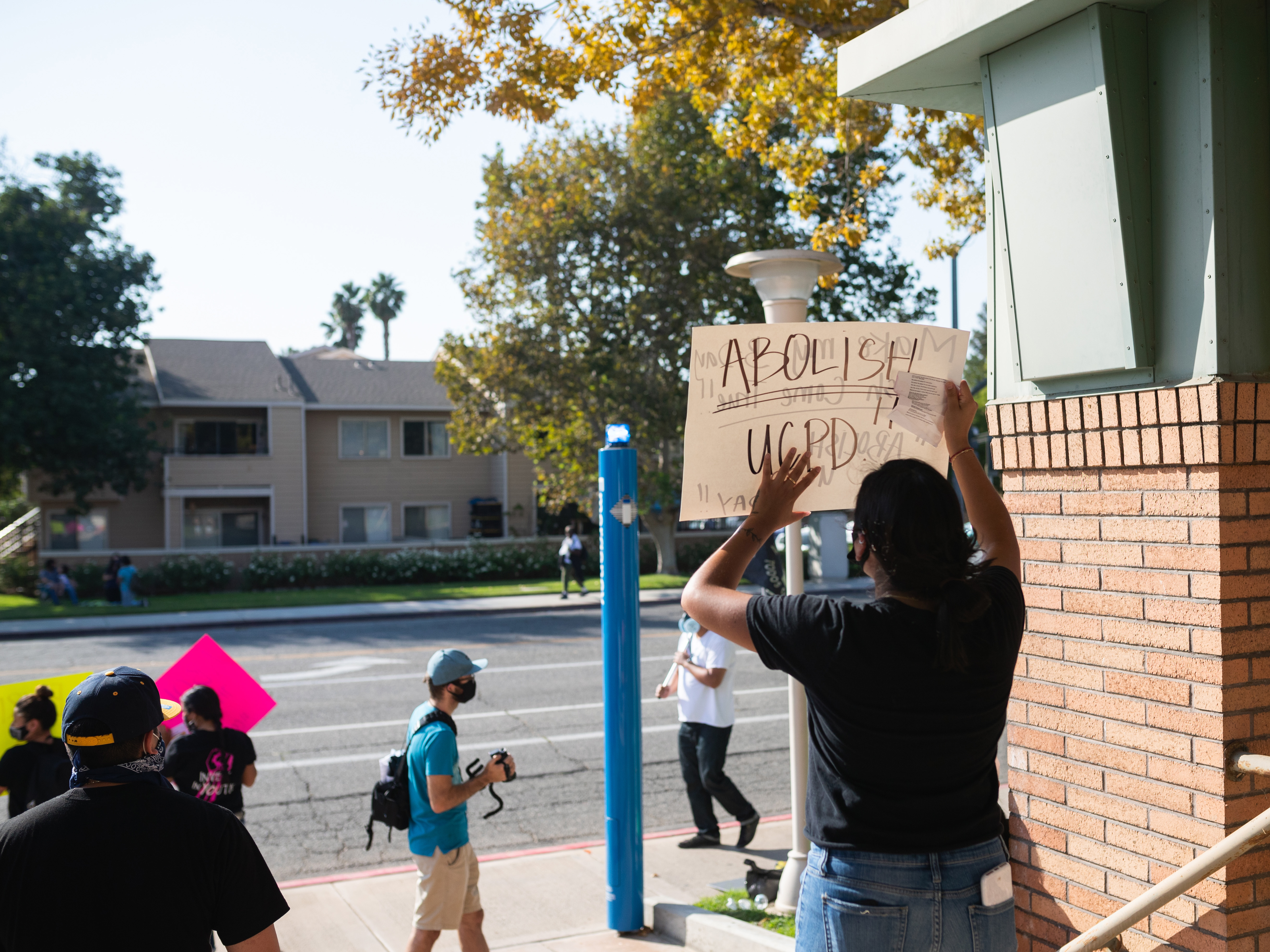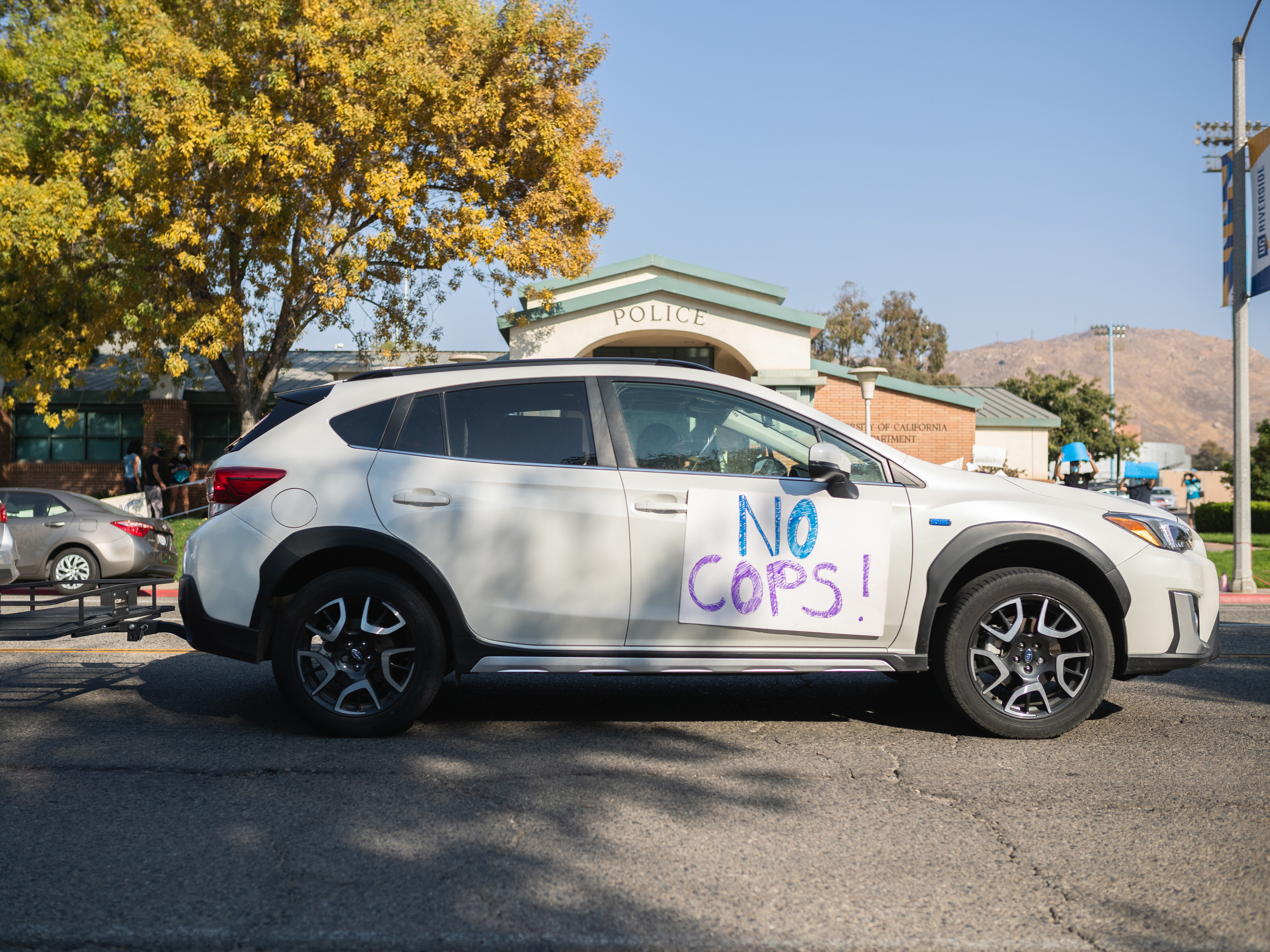On Thursday, Oct. 1, UCR students and faculty participated in the UC Cops Off Campus Coalition’s statewide day of action to remove police from all UC campuses by Sept. 1, 2021.

In partnership with non-profit organization Critical Resistance and the help of Scholars for Social Justice, the American Studies Association (ASA), the Riverside Faculty Association (RFA) and the UCR chapter of the UC Cops Off Campus Coalition hosted part one of their teach-in series on anti-Blackness, the university and policing followed by a demonstration in front of the UCPD station on Canyon Crest Drive. Despite being the first day of classes, many departments on campus expressed their solidarity with the day of action of the efforts of UC Cops Off Campus Coalition. The Department of Ethnic Studies and Department of Anthropology both expressed in an email, “We must acknowledge that policing disproportionately violates Black, Brown, Indigenous, queer, trans, poor peoples, and immigrants, rendering many members of our campus and its communities less safe … (we) will not retaliate against undergraduate or graduate students who join the abolition events happening statewide on 10/1.”
The event was moderated by media and cultural studies Professor Dylan Rodriguez and featured a series of panelists and scholars from across the country. The featured panelists included João Costa Vargas, author and professor of anthropology at UCR, Savannah Shange, an assistant professor of anthropology and critical race and ethnic studies at the University of California, Santa Cruz, Lester Spence, professor of political science and africana studies at Johns Hopkins University and Cathy Cohen, professor of political science at the University of Chicago and author of “The Boundaries of Blackness: AIDS and the Breakdown of Black Politics.”
Spence began the discussion by focusing on the exclusionary practices he has observed at Johns Hopkins University as well as how he has seen how organizing groups such as Occupy Baltimore and the Baltimore Algebra Project have influenced a muti-racial coalition of voters at the university. Spence also discussed the importance of allyship in building successful movements against policing on campuses, stating, “as we center Blackness in our analysis … a number of the folks who are organizing at Hopkins against police did so knowing that they would not be directly harmed by policing at all.”
Shange then began discussing the relationship between K-12 schools and the police, mentioning the school to prison pipeline and the larger practices of policing in schools that do not necessarily have anything to do with law enforcement. Shange noted that while 50 to 70% of public funding goes to law enforcement, the other half, which is divided into education, healthcare and housing, is still heavily policed by having harsh disciplinary actions in schools, racial disparities in healthcare and housing discrimination. “We need to understand that these places are not our refugees, they are exactly that battleground,” stated Shange. According to Shange, the abolition of any type of law enforcement on campuses is only the first step in abolishing the policing practices that makes up the foundation of the United States.
“The work of anti-Blackness and white supremacy within the university extends far beyond slavery,” stated Cohen. She added that it includes the university being a site of knowledge production meant to exploit, experiment on and perfect strategies of surveillance and policing that specifically target Black Indigenous people. It also includes the university often being the largest employer in and near BIPOC communities where they can use their power to extract resources from neighbourhoods as well as universities destabilizing communities by taking over land. This, according to Cohen, is fundamentally the logic of the neo-liberal plantation, an established racial hierarchy with extractive practices.
Another point made by Cohen was that explicit policing on campus is deployed not only to control who is allowed on campus but to increasingly manage what is allowed off campus. This creates an absence of economic, social and political investment in the empowerment of communities surrounding universities and instead creates an investment in policing as a way to shield those who “belong” to the university from those who are rightfully angry, enraged over having been neglected from resources and opportunities, stated Cohen. Another form of policing in academia is representational diversity or tokenism across universities which Cohen refers to as “superficial diversity.”
Vargas then went on to explain his definition of abolition and the consequences of obscuring and minimizing anti-Blackness in our understanding and analysis of the university and its policing function. In the world of anti-Blackness, there is a fundamental division between Black people and non-Black people, and alliances are formed that recognize the fundamental place of Black people in the constitution. According to Vargas, in a world where anti-Blackness is minimized, multi-racial alliances are a possibility but not a necessity. However, he stated that in a world of anti-Blackness, “nothing short of a completely different world will do.”
The panel answered a few questions from students before concluding the teach-in and moving to the socially-distanced demonstration and car caravan that took place in front of the UCPD station located on Canyon Crest Drive and Linden Avenue.

Braving the 106 degree weather, about 30 students from UCR and around the Riverside community gathered with signs that read “Cops Off Campus” and “Abolish UCPD” and marched toward the UCPD station. No officers were present throughout the duration of the demonstration. Cars honked in support of the marchers as they chanted “UCPD has got to go” and “We want freedom, not police.”
Humberto Flores, a second-year Ph.D. student in sociology told The Highlander that a cop-free university would mean finding other forms of community led restorative justice, where the UCR community would work to keep each other safe.
The full teach-in can be viewed on-demand through the Critical Resistance Facebook page. The followup teach-in will be held on Thursday, Nov. 5 via Zoom and will focus on abolition, Black study, and Black studies at UCR.







